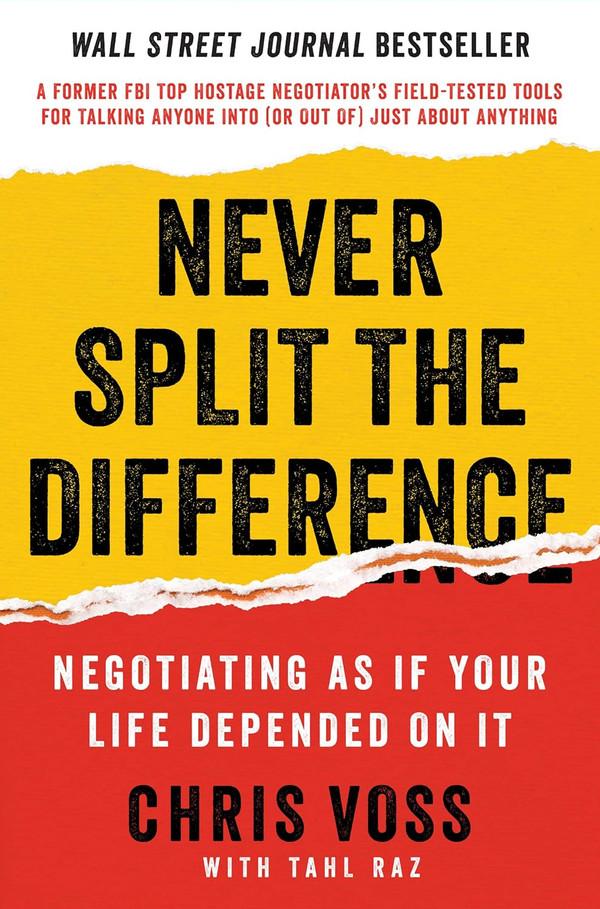Harper A.'s Key Ideas from Never Split the Difference
by Chris Voss, Tahl Raz
Ideas, facts & insights covering these topics:
18 ideas
·304K reads
1.2K
18
Explore the World's Best Ideas
Join today and uncover 100+ curated journeys from 50+ topics. Unlock access to our mobile app with extensive features.
The Framing Effect
It happens when people respond differently to the same choice depending on how it is framed.
People place greater value on moving from 90 percent to 100 percent—high probability to certainty—than from 45 percent to 55 percent, even though they’re both ten percentage points.
4.07K
43.4K reads
Tactical Empathy
Tactical empathy means balancing the subtle behaviors of emotional intelligence and the assertive skills of influence, to gain access to the mind of another person.
Psychotherapy research shows that when individuals feel listened to, they tend to listen to themselves more carefully and to openly evaluate and clarify their own thoughts and feelings. In addition, they tend to become less defensive and oppositional and more willing to listen to other points of view.
4.11K
25.9K reads
"Contrary to popular opinion, listening is not a passive activity. It is the most active thing you can do."
CHRIS VOSS
3.83K
29.3K reads
Life Is A Negotiation
- The majority of the interactions we have at work and at home represent negotiations.
- Negotiation serves two distinct functions: information gathering and behavior influencing—and includes almost any interaction where each party wants something from the other side.
- Negotiation is not an act of battle; it’s a process of discovery. The goal is to uncover as much information as possible.
3.87K
20.9K reads
"Negotiation as you’ll learn it here is nothing more than communication with results. Getting what you want out of life is all about getting what you want from—and with—other people. Conflict between two parties is inevitable in all relationships. So it’s useful—crucial, even—to know how to engage in that conflict to get what you want without inflicting damage."
CHRIS VOSS
3.6K
18.8K reads
Your Voice When Negotiating
Your most powerful tool in any verbal communication is your voice.
There are essentially 3 voice tones available to negotiators:
- The late-night FM DJ voice: Inflect your voice downward, keeping it calm and slow, to create an aura of authority.
- The positive/playful voice: It’s the voice of an easygoing, good-natured person.
- The direct or assertive voice: Used rarely. Will cause problems and create pushback.
4.13K
18K reads
Passage Of Time: The Most Important Tool For Negotiators
Going too fast is one of the mistakes all negotiators are prone to making. If we’re too much in a hurry, people can feel as if they’re not being heard and we risk undermining the rapport and trust we’ve built.
The passage of time is one of the most important tools for a negotiator. When you slow the process down, you also calm it down. After all, if someone is talking, they’re not shooting.
3.66K
14.5K reads
"The goal is to identify what your counterparts actually need (monetarily, emotionally, or otherwise) and get them feeling safe enough to talk and talk and talk some more about what they want. The latter will help you discover the former."
CHRIS VOSS
3.58K
14.1K reads
The Mirroring Technique
A “mirror” is when you repeat the last three words (or the critical one to three words) of what someone has just said.
Mirroring is the art of insinuating similarity, which facilitates bonding. By repeating back what people say, you trigger this mirroring instinct and your counterpart will inevitably elaborate on what was just said and sustain the process of connecting
4.08K
14.1K reads
Labelling Emotions
Instead of ignoring emotions, good negotiators identify or influence them.
Labeling is a technique used to acknowledge a counterpart’s emotion, leaving them feeling validated:
- Detect the other person’s emotional state
- After spotting an emotion you want to highlight, label it aloud without using “I” statements
- After throwing out a label, be quiet and listen.
- You’re dealing with a person who wants to be appreciated and understood. So use labels to reinforce and encourage positive perceptions and dynamics.
3.73K
12.5K reads
"Great negotiators seek 'No' because they know that’s often when the real negotiation begins."
CHRIS VOSS
3.44K
14.2K reads
“No” Has A Lot Of Skills
- No” allows the real issues to be brought forth
- “No” protects people from making—and lets them correct— ineffective decisions
- “No” slows things down so that people can freely embrace their decisions and the agreements they enter into
- “No” helps people feel safe, secure, emotionally comfortable, and in control of their decisions
- “No” moves everyone’s efforts forward.
3.66K
12.1K reads
Negotiation: "That’s Right" > " Yes'
Reaching “that’s right” in a negotiation creates breakthroughs (it conveys true understanding of someone's reality).
Use a summary to trigger a “that’s right.” The building blocks of a good summary are a label combined with paraphrasing. Identify, rearticulate, and emotionally affirm “the world according to . . .
3.49K
11.6K reads
Create The Illusion of Control
- Don’t try to force your opponent to admit that you are right.
- Avoid questions that can be answered with “Yes” or tiny pieces of information. Ask calibrated questions that start with the words “How” or “What.”
- “Why” is always an accusation, in any language.
- Calibrate your questions to point your counterpart toward solving your problem.
- When you’re attacked in a negotiation, pause and avoid angry emotional reactions.
- There is always a team on the other side. If you are not influencing those behind the table, you are vulnerable.
3.88K
10.9K reads
The Rule Of Three In Negotiation
It means getting the other person to agree to the same thing three times in the same conversation.
In doing so, it uncovers problems before they happen. It’s really hard to repeatedly lie or fake conviction.
3.58K
11.1K reads
The Pinocchio Effect
People who are lying are more worried about being believed, so they work harder at being believable.
The researchers dubbed this the Pinocchio Effect because, just like Pinocchio’s nose, the number of words grew along with the lie.
3.56K
11.4K reads
Identify Your Counterpart’s Negotiating Style
- The accomodator: The most important thing to this type of negotiator is the time spent building the relationship; as long as there is a freeflowing continuous exchange of information time is being well spent.
- The analyst: Analysts are methodical and diligent. They are not in a big rush.
- The assertive: The Assertive type believes time is money; every wasted minute is a wasted dollar.
Knowing their negotiation style will help you to find the correct way to approach them.
3.57K
9.73K reads
Types of Leverage
- Positive Leverage: Your ability as a negotiator to supply or withhold things that your counterpart
- Negative Leverage: A negotiator’s ability to form his counterpart suffer
- Normative Leverage: Using the opposite party’s norms to advance your position.
3.36K
11.4K reads
IDEAS CURATED BY
Curious about different takes? Check out our Never Split the Difference Summary book page to explore multiple unique summaries written by Deepstash users.
Harper A.'s ideas are part of this journey:
Learn more about psychology with this collection
How to close the deal
How to handle objections
How to present your value to your employer
Related collections
Different Perspectives Curated by Others from Never Split the Difference
Curious about different takes? Check out our book page to explore multiple unique summaries written by Deepstash curators:
9 ideas
4 ideas
1 idea
Discover Key Ideas from Books on Similar Topics
Read & Learn
20x Faster
without
deepstash
with
deepstash
with
deepstash
Personalized microlearning
—
100+ Learning Journeys
—
Access to 200,000+ ideas
—
Access to the mobile app
—
Unlimited idea saving
—
—
Unlimited history
—
—
Unlimited listening to ideas
—
—
Downloading & offline access
—
—
Supercharge your mind with one idea per day
Enter your email and spend 1 minute every day to learn something new.
I agree to receive email updates









